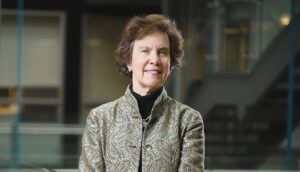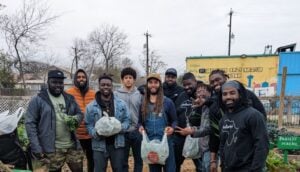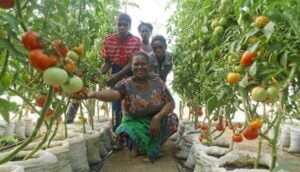Empowering women benefits everyone and is essential for cocoa growing communities to thrive. Research shows that increasing women’s involvement leads to improved financial management by farmers, better education of youth and more sustainable, thriving communities. Cocoa Life, Mondelez International’ cocoa sustainability program, is deliberate about promoting women’s empowerment. Cocoa Life has worked to mainstream gender empowerment and to increase women’s agency across the cocoa sector since 2008. Our work continues to evolve as we work with partners such as Abantu for Development, CARE International, VSO, World Vision, Save the Children and Solidaridad in key cocoa growing origins like Ghana, Cote d’Ivoire and Indonesia.
Striking gaps in gender equality still exist in cocoa growing communities.
There is a lot to be done to reach gender equality in cocoa-growing countries. Research done by Stephanie Barrientos, Institute of Development Studies, Manchester University shows[1] that 40% of the work is done by women, yet they only own 2% of the land. Cocoa Life’s third-party assessments done by Harvard University for Ghana[2] and by CARE International for Cote d’Ivoire[3], tell that in Ghana, female cocoa farmers earn 25-30 percent less than male farmers. In Cote d’Ivoire it’s as much as 70 percent less than men, and there are more gaps. In both countries, women struggle with lower farm productivity, smaller farms and less access to finance and farm inputs.
These studies tell us, and our experience shows that if women were to receive equal access to land, finance, training and inputs, we would see productivity increase significantly. This is critical to increase the income of cocoa farming families.
Incorporating the perspective of female farmers in program design and implementation is critical.
Promoting women’s empowerment and increasing women’s agency has been an essential element of Cocoa Life since 2008. Cocoa Life is deliberate in empowering women as cocoa farmers, as farm workers, as well as at the heart of cocoa growing communities. It means in practice that gender awareness is integrated among Cocoa Life program leaders at all levels. Further the perspective of female farmers is incorporated in program design and implementation and local cocoa platforms are used to promote gender goals.
An example of program design and implementation is the alignment with partners along the supply chain to include youth and women in the farmer training. When farmer training is delivered, Cocoa Life makes sure to maximize women’s participation, for example by arranging for women to deliver training and that it takes place where and when women can attend.
While we focus on the role of women in cocoa farming, we continue to support their wider role in the community.
For example, Women’s Extension Volunteers in Ghana provide practical guidance to women in their community by teaching farming practices that will lead to higher yields, offering entrepreneurial ideas for the non-harvesting season to insure year-round earnings, and by creating programs in communities that support health, hygiene, education, and gender equality.
Through interventions like Women’s Extension Volunteers women gain more confidence to adopt leadership positions in farmer groups and local government positions.
As part of the Cocoa Life approach, our NGO partners facilitate the development of Community Action Plans (CAPs) using processes that ensure women’s priorities are included. As these CAPs are implemented, women participate and adopt leadership roles alongside their male colleagues.
Providing access to finance to increase livelihoods mainly targets women.
Facilitating women’s access to finance is important to improve livelihoods. Cocoa Life has introduced a Village Savings and Loans Associations scheme, originally developed by Care International, across all 446 communities in Ghana and 219 communities in Cote d’Ivoire. 70% of the participants of these VLSA’s are women. These structures provide women with training in business, financial literacy and entrepreneurial skills and offer credit schemes that target women specifically. They use the funds for a broad range of investments including: purchase of fertilizers allowing them to increase their yield, start-up capital for new businesses, and hiring laborers. Also, they use it for school uniforms and school fees.
Strong linkage between women’s empowerment, education and child development.
There is a strong linkage between, women’s empowerment, education and child development. In Ghana, under guidance from the government’s Commission on Human Rights and Administrative Justice and the Department of Social Welfare, Cocoa Life so far introduced Gender and Child Protection Committees (GCPCs) in 9 out of the 16 districts. As well as supporting women’s empowerment, these committees sensitize and promote education on issues relating to child labor and abuse in their respective communities.
As part of its holistic, farmer centred approach, Cocoa Life supports women’s empowerment in cocoa farming communities. This is important for women and it also benefits everyone by increasing livelihoods, better education of youth and child protection, overall creating more sustainable, thriving and empowered cocoa farming communities.










